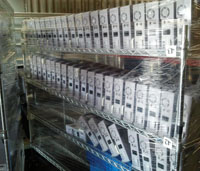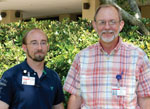|
by
Caroline Altman
Public Relations
In what makes
great sense for recycling and for
global health, MUSC's latest
outreach to Tanzania involves the
donation of more than $1 million
worth of surplus equipment no
longer being used here.
Randy Pauling,
biomedical engineering supervisor,
said just because equipment is
old, doesn't mean it no longer
works. "Stuff that's trash to us
is gold to someone else, and these
monitors are gold to the
Tanzanians," he said, referring to
the one lone battery-operated
pulse oximeter that currently
exists in the 150-bed Lutheran
Memorial Hospital in Haydom.
 Equipment being
sent to Tanzania was organized,
crated and stored in MUSC's
warehouse before being sent. Equipment being
sent to Tanzania was organized,
crated and stored in MUSC's
warehouse before being sent.
Thanks to MUSC
and a local non-profit Madaktari
Africa, there soon will be 12 more
of them in Haydom's hospital. More
than 40 Phillip monitors and 100
Nellcor pulse oximeters from MUSC
are going to three hospitals in
Tanzania.
In Tanzania, the hospitals have
limited resources and only 5.2
health care workers for every
10,000 people. The Department of
Anesthesia and Perioperative
Medicine has been sending faculty
and residents to the Bugando
Medical Center in Mwanza,
Tanzania, for the past three years
as part of the globalization
efforts in MUSC's Strategic Plan
2010-2015. In addition, the goal
of the program is to give African
medical staff the tools and
training they need to provide
health care to patients and teach
others how to do the same.
During a trip
to Tanzania in 2010, Carlee Clark,
M.D., assistant professor of
anesthesia and perioperative
medicine, found that physicians
were trying to provide anesthesia
with limited resources and needed
equipment. The donated equipment
will allow physicians to monitor
patients' vital signs and help
them determine what treatment to
provide for them.
Pauling, who
helped with organizing and packing
the equipment, learned from the
MUSC anesthesiologists that
patients were dying both in the
operating rooms and later in the
recovery room because of an
inability to monitor patients
undergoing surgery. "There is no
way to alert medical personnel if
a patient starts having
complications. These monitors will
save lives."
 Robert Tritt, left,
and Randy Pauling packed the
supplies. Robert Tritt, left,
and Randy Pauling packed the
supplies.
MUSC's former
neonatal ICU equipment had been
sitting in a warehouse for more
than a year, unusable to the
hospital anymore. Meanwhile, Scott
T. Reeves, M.D., chairman for the
Department of Anesthesia and
Perioperative Medicine, was
arranging for the equipment to be
donated by MUSC and sent to
Tanzania to support his
department's efforts in Mwanza. As
the equipment was being cataloged,
it became possible to expand the
opportunity to provide equipment
to three Tanzania hospitals
including the Lutheran Memorial
Hospital in Haydom, the Muhimbili
National Cardiac Center in Dar
Salam and the Bugando Medical
Center in Mwanza.
Through months
of volunteer work, the equipment
has been packed into multiple
crates and is being shipped to
Tanzania. Once the shipment has
arrived, Robert Tritt, biomedical
technician, will be visiting to
teach how to install, maintain and
work on the equipment. Pauling
said Tritt was the perfect choice
to go because the NICU was his
area. "I was really happy when he
wanted to go, because he knows
these monitors as well as anyone
here."
Tritt said it
will be fascinating to be in
Tanzania teaching others how to
work on the same equipment that he
has been working with for the past
eight years in Charleston. "I've
taught people over here, but this
is a little different. Once I
leave Tanzania, they are on their
own. I need to make sure I convey
everything I need to them."
Kathleen Ellis,
director of operations, Center for
Global Initiatives, said this
project shows the amazing impact
of what can happen when multiple
departments collaborate across
campus. The long-term plan at the
center is to work across campus to
develop a formal process for
donating surplus medical equipment
and supplies overseas so there's a
structured process versus having
to do it on a project-by-project
basis.
"The benefits
are great for everyone.This type
of initiative supports our global
health and community service
missions while allowing us to look
at ways to help lower operational
costs, reduce waste and promote
resource sustainability through
the recycling of usable surplus
medical supplies and equipment."
Ellis said what
makes this initiative so effective
is that Reeves and his colleagues
spent time up front, assessing the
needs of the local hospitals and
the limitations of basic
infrastructure, such as
electricity reliability and staff
support, before assembling the
appropriate equipment.
"Sending a
'trainer' to ensure that the
people receiving the supplies know
how to use them and maintain them
is what makes all the difference.
It means the donated supplies that
often end up unused in developing
countries due to lack of training,
lack of replacement parts or
inability can actually be
used."
To learn about
MUSC's Center for Global
Initiatives, visit http://globalhealth.musc.edu
or join MUSC Global on facebook.
Reeves
said the project happened with
the support of many people,
including: Lisa Montgomery, MUSC
CFO for assisting with state
appropriations; Teresa Hacunda,
director of Civic Affairs for
Covidien, for aiding in getting
supplies; Dan Altman, support
services operation manager, for
establishing contact with
Hacunda; Chris Fennell, courier
coordinator at the warehouse,
for navigating the state system
to obtain the donation; Carlee
Clark, M.D., for identifying
appropriate equipment; Doyle
Word, CEO of Madaktari Africa,
for arranging the container ship
and ground transportation; and
Cathy and Townsend Reeves, for
packing.
|



 Equipment being
sent to Tanzania was organized,
crated and stored in MUSC's
warehouse before being sent.
Equipment being
sent to Tanzania was organized,
crated and stored in MUSC's
warehouse before being sent.  Robert Tritt, left,
and Randy Pauling packed the
supplies.
Robert Tritt, left,
and Randy Pauling packed the
supplies.